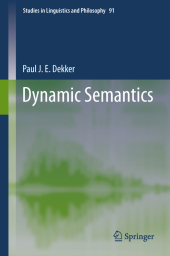 Neuerscheinungen 2014Stand: 2020-02-01 |
Schnellsuche
ISBN/Stichwort/Autor
|
Herderstraße 10
10625 Berlin
Tel.: 030 315 714 16
Fax 030 315 714 14
info@buchspektrum.de |

Paul J.E. Dekker
Dynamic Semantics
2012. 2014. viii, 128 S. 235 mm
Verlag/Jahr: SPRINGER NETHERLANDS; SPRINGER 2014
ISBN: 9401781702 (9401781702)
Neue ISBN: 978-9401781701 (9789401781701)
Preis und Lieferzeit: Bitte klicken
The first publication to include a condensed, yet complete treatment of anaphora and modality, this volume´s integrated theory combines classical formal semantics and modern dynamic semantics without altering the fundamental linguistic paradigm.
The integrated theory of dynamic interpretation set out here will be a surprise to advanced researchers in linguistics. It combines classical formal semantics and modern dynamic semantics without altering the fundamental paradigm. At the book´s core lies a pragmatically motivated notion of a dynamic conjunction of meanings, an idea that is worked out in full formal detail. This is applied to linguistic phenomena that involve anaphora, quantification and modality. The author demonstrates that in each area of application existing data can be neatly combined with new dynamic insights, but more importantly, there is a genuine further pay-off: the work generates treatments of phenomena that were not initially intended, with functional readings of pronouns and quantifiers, ´Hob-Nob´ sentences, and insights into what we now call ´Pierce´s Puzzle´.
The outcome of a decade of work by the Amsterdam School of dynamic semantics, this volume condenses and reflects upon a vital body of research.
1.Introduction .- 2. Predicate Logic with Anaphora . 2.1. Static and Dynamic Semantics . 2.2. First Order Satisfaction in PLA . 2.3. Logical Properties of PLA . 2.4. On the Representation of Information .- 3. Information Update and Support . 3.1. Coreference and Modality . 3.2. Update and Support . 3.3. Information Exchange . 3.4. On the Contextualist Debate .- 4. Quantification and Modality . 4.1. Terms and Quantifiers . 4.2. Knowing Who and Believing What . 4.3. Alethic and Epistemic Modality . 4.4. On Situations and States .- 5. Conclusion .- Bibliography .- Index


